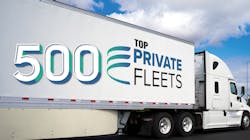FleetOwner 500: Top Private Fleets of 2023
In a time of transportation uncertainty, as the trucking industry still recovers from problems that upended supply chains, more companies are investing in their own private fleets, as evident by the many new brands debuting on the FleetOwner 500: Top Private Fleets of 2023 list.
More than 120 companies on this private FleetOwner 500 were not among last year's rankings. Another 11 companies jumped more than 100 spots in the rankings of companies that own a fleet of vehicles to support businesses that range from wholesale and retail, public utility, manufacturing, construction, waste management, agriculture, and more.
Going into 2022, a National Private Truck Council survey of more than 100 fleets found that shipments increased by 10.3% in 2021 from 2020. The reported volume of private carriers was up by 7.3%, according to the 2022 NPTC Benchmarking Report. Also, shipment values rose in this year's survey by 11.5%, compared to 9.7% last year and 12% two years ago.
See also: FleetOwner 500: Top for-hire fleets of 2023
Returning to the top of the private 500 list is utility AT&T, with more than 27,000 power units (as of Dec. 31, 2022), jumping from No. 3 in 2022 and supplanting refuse fleet Waste Management. AT&T last held the top spot in 2020. PepsiCo remains the second largest fleet in the U.S.
Three fleets moved into the Top 10 for 2023: Asplundh, a utility maintenance contractor, moved up 15 spots to No. 7; retailer Walmart is up 12 spots to No. 8; and Waste Connections is up six places to No. 10.
One of the most significant moves in the private FleetOwner 500 was by DG Logistics, the transportation arm of retailer Dollar General. The private fleet moved up 153 spots, from No. 298 to No. 152.
Another significant reason this year's list might look different to regular readers is that we partnered with a new data analysis firm, ProsperFleet. This is the same firm that revamped the FleetOwner 500: Top For-Hire Carriers of 2023 list that debuted earlier this year. Like past lists, rankings are based on power units reported to the Federal Motor Carrier Safety Administration's Safety and Fitness Electronic Records (SAFER) System. So, the private 500 only includes vehicle classes required to register with the U.S. Department of Transportation, leaving out some lighter-class fleets and units.
We also have included top 10 lists, broken down by equipment type and trailers, and the top types of private fleets by business category. And new this year, we have added some fleets to watch—those that just missed the 500 list.
ProsperFleet relies primarily on the most recent information that entities filed on form MCS-150 with FMCSA to count power units, trailers, and drivers. This ensures a consistent "basis" (a level playing field) to compile information. Analysts at ProsperFleet also use the companies' websites, press releases, and hierarchy from their business databases to roll up USDOT operating entities to a single parent company. ProsperFleet then cleanses, validates, standardizes, and enhances company and contact information to create a complete fleet view.
For companies with subsidiaries and divisions that have USDOT numbers, the subsidiary vehicle counts are included in the parent company total. Fleets that were previously on the list but were acquired in late 2021 or 2022 will not appear on the list in 2023 because of this roll-up to parent companies. Instead, their power unit counts are now included in the new parent company totals.
This year's rankings are based on data reported to FMCSA as of Dec. 31, 2022.
